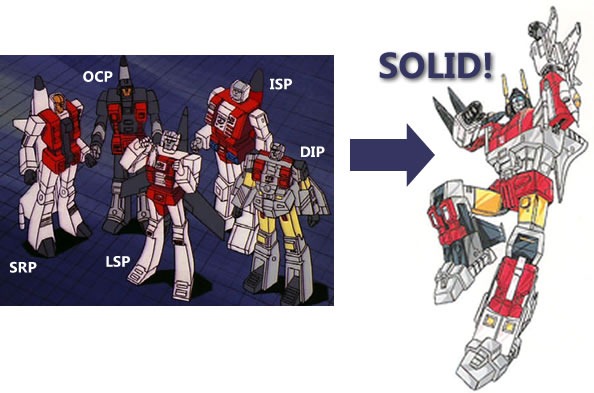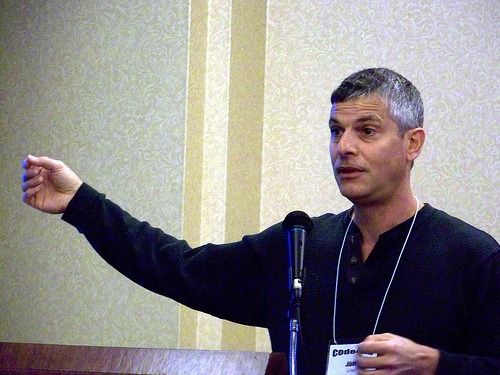If you’ve worked with CSS and multiple browsers long enough, this mug will make you laugh (or cry):
At US$12.95 (available at Zazzle.com), it’s a pretty good “Secret Santa” gift for the web developer or designer on your team.
If you’ve worked with CSS and multiple browsers long enough, this mug will make you laugh (or cry):
At US$12.95 (available at Zazzle.com), it’s a pretty good “Secret Santa” gift for the web developer or designer on your team.
This article also appears in Canadian Developer Connection.

Justice Gray is concerned about TechDays, Microsoft Canada’s touring conference that will hit seven cities this fall. So he wrote an open letter, in which he stated:
I’m a big "fundamentals" guy, and TechDays hasn’t traditionally focused on any sort of development fundamentals. It’s been more focused on specific Microsoft technology demos.
He’s right – one of the key goals of TechDays is to showcase current Microsoft tools and technologies, show you how to make use of them and give you an idea of what’s possible. As the “owner” of one of the conference tracks – I’m in charge of the Developing for the Windows Platform track – I’ve taken great care to choose sessions that cover tools and technologies that are currently available but are things that you might not be using…yet. Many people’s day-to-day work keeps them focused on their particular department’s or project’s technologies and doesn’t give them any opportunities to see what else is out there. One of the goals of TechDays is to provide such an opportunity.
Because he is “Justice” by nature as well as name, he’s quite understanding:
I hasten to add that this is completely within Microsoft’s right and totally makes sense. Microsoft is first and foremost a business and this is a good place to promote itself!
What he’d like to see is a greater emphasis on developer fundamentals:
However, I’m a little less excited about "let’s look at another spinning animal demo" vs. "let’s teach common design patterns" or even "let’s actually show developers how to use half of the relevant Application Blocks in a legitimate application that isn’t a Northwind demo".

Justice’s concern about TechDays stems from my recent article on the SOLID principles, which I posted here on Global Nerdy as well as on Microsoft Canada’s developer blog, Canadian Developer Connection. What really got him was a question and answer I included in the article:
Will There be a Presentation on SOLID at TechDays Canada 2009?
Mmmmmmmaybe…
He interpreted the “Mmmmmmmaybe…” as “no”. Based on that interpretation, he made what might be considered to be a logical assumption: that I wrote the post as a quick way to compensate for the fact that SOLID wouldn’t be a topic at TechDays.

In fact, SOLID will be the topic of a session in the Developing for the Windows Platform track. The session’s working title is SOLIDify Your ASP.NET MVC Applications, and it covers the SOLID principles by way of refactoring an ASP.NET MVC application.
There’s a perception that Microsoft developers care less about things like good design and coding practices than those in the Java and open source worlds do. Whether that perception is true or not, I figured that I’d try to address both the perception and the reality by filling the “back end” day of my track – that’s day 2; day 1 is all about developing for the “front end” – with sessions that covered technique as well as tooling:
Choosing the sessions that would go into TechDays was a juggling act, what with:
Each track owner had to balance these factors when choosing sessions for this track. I believe that the end result (which will be online soon) is a pretty good one.
I wrote an article about SOLID not because it had been excluded from the Developing for the Windows Platform track, but because it was included. That post was meant to be an “appetizer” for the session> I wanted everyone attending the SOLID session to have at least a passing familiarity with the SOLID principles. Learning takes repetition and retaining that learning takes continual exposure, so I thought I’d get a head start by posting an article and hinting (which is what my “Mmmmmmmmaybe” was about) that it would be a topic at TechDays. I also thought that articles on SOLID might generate interest in the session.
There will be more articles looking more closely at each of the SOLID principles. The article was the first step toward posting more articles on technique and best practices. I think that it’s an area that Canadian Developer Connection can and should cover, because there’s more to building software than knowing your way around Visual Studio and Expression or being able to list the functionalities offered by a given class library. There’s the accumulated wisdom of developers in the form of things like design patterns, fundamentals like coupling and cohesion, concepts like DRY, convention over configuration and the Law of Demeter, practices like secure, agile and test-driven development and so on. I want to help make better developers, because better developers make for a better industry — and a better Microsoft as well.
While TechDays sessions provide an interactive and up-close-and-personal learning experience that a blog can’t, there are good reasons to use blogs to cover the fundamentals. We can point TechDays attendees to blog posts to reinforce the material covered in the sessions, and people who weren’t able to make it to TechDays can also benefit. We can cover topics in greater depth in a blog article than we can in a presentation, with more detailed explanations and diagrams as well as more code and examples. There’s also the reach and permanence of a blog article: they’re accessible by anyone, anytime, and more importantly, they can be indexed by search engines.
![the-room[1] the-room[1]](https://www.globalnerdy.com/wordpress/wp-content/uploads/2009/07/theroom1.jpg)
In the end, we want to help developers become the best they can be. That means making sure that they know how to get the most out of our tools and technology, but it also means helping out in areas not directly related to selling our wares, such as helping build developer communities and covering topics like good software design and best practices, both online and in real life.
What would work best for you? Would you like to see more fundamentals-oriented sessions in future versions of TechDays or other conferences? More presentations on the fundamentals at local workshops or user groups? More articles? More screencasts? Let us know, either in the comments or drop me a line directly. A lot of our planning is based on your input, so the more you tell us, the better.
It’s been announced on the Windows Blog: Windows 7 has been released to manufacturing!
Brandon LeBlanc explained that “RTM” happens only after it’s been signed off. One of the release candidate builds becomes a contender for release to manufacturing after it goes through significant testing and passes all the validation tests for RTM including having all languages for that build completed. Build 7600 crossed all those hurdles and got signed off today.
The beta and release candidate period for “Seven” was quite unusual. Rather than hand it out to a closed group of beta testers, it was made available for download and I was given piles and piles of DVD-ROMs to hand out like candy. And strangely enough, people were asking for it. At the EnergizeIT installfests this spring, we played to packed rooms of people who took time out of their Saturday mornings and schlepped to Mississauga to install the beta. Even people with Macs, who ran it under Boot Camp or Parallels. It’s unusual for an operating system in beta – especially one from The Empire – to be in such demand.
I’ve been using the beta since January and the release candidate for the past few weeks as my primary operating systems with nary a hitch, glitch or blue screen. I’m looking forward to getting the final version of Windows 7, which will be the first of many new goodies coming from The Empire over the coming months,
If you’re a developer with an MSDN subscription or an IT pro with a TechNet subscription, you’ll be able to download the English Windows 7 RTM on August 6th, with other language versions on October 1st. Windows 7 will go on sale to the general public on October 22nd.
 Windows Server 2008 R2 was also released to manufacturing today. As they state in the Windows Server Division Weblog, the simultaneous release is no coincidence but a design goal. “R2”, as I prefer to call it, boasts a lot of features such as Hyper-V, Live Migration, File Classification Infrastructure, an improved Active Directory, Pervasive PowerShell, IIS 7.5, server scalability, DirectAccess, BranchCache and improved Remote Desktop.
Windows Server 2008 R2 was also released to manufacturing today. As they state in the Windows Server Division Weblog, the simultaneous release is no coincidence but a design goal. “R2”, as I prefer to call it, boasts a lot of features such as Hyper-V, Live Migration, File Classification Infrastructure, an improved Active Directory, Pervasive PowerShell, IIS 7.5, server scalability, DirectAccess, BranchCache and improved Remote Desktop.
This article also appears in Canadian Developer Connection.

Jon Udell – the developer, information architect, author who wrote about social software before we started calling it that, blogger and Senior Tech Evangelist at Microsoft – will be in Toronto next week and he’ll be at a couple of events that I’m attending.
On Tuesday, John will be at the 21st edition of DemoCamp, the show-and-tell event for people in the Toronto tech community, where entrepreneurial developers, designers, marketers and businesspeople get together to talk about what they’re working on, exchange ideas and get to know each other. We’re about using the power of technology and creativity to make Toronto (and the world) a better place to live, work and play. And yes, Yours Truly will help host the event.
Watch this blog for more details about next week’s DemoCamp, including the demos and Ignite presentations that will be featured that night.
On Wednesday, John will be at Science 2.0, a conference exploring the ways in which computers and the internet are changing the way science is done. Speakers and presentations at Science 2.0 include:
John will have a talk at Science 2.0 in which he’ll cover the elmcity project, a community calendaring system running on the Azure platform and how it “tackles the challenge of social information management and aims to democratize the computational way of thinking that enables us to wire the web.”
I’ll be taking notes at both events and will post them on this blog.

One quick announcement: I’m going to be at a couple of Coffee and Code events this week:
Be there!
This article also appears in Canadian Developer Connection.

If you’re a developer looking for a job – or if you already have a job and are looking for a better one – you’ll want to check out Microsoft’s new Thrive for Developers, which describes itself as a one-stop community hub for advancing your career, enhancing your skills and connecting with your community. Having stuff like this has always been important, but it’s even more so in the middle of what I like to refer to as “The Econopocalypse”.
Some of the features on Thrive for Developers are:
Whether you’re looking to get into the game or stay on top of yours, Thrive for Developers is a great resource worth checking out.
O’Reilly’s conference on Open Source, OSCON, takes place this week in San Jose, California. One of the events taking place at OSCON is the Open Source Language Roundtable, the abstract for which appears below:
We all have our favorite languages in our tool-belt, but is there a ‘best’ overall language? If anyone can hash that out, it will be the members of this roundtable discussion, some of the stars of the open source language space. This wide-ranging session, hosted and moderated by the O’Reilly Media editorial staff, and broadcast live on the web, will try to identify the best and worst features of each language, and which are best for various types of application development.
The roundtable will me moderated by O’Reilly Media’s James Turner and will cover the following languages, listed below with the corresponding panelist:
You can catch this roundtable even if you’re not going to be at OSCON because O’Reilly is webcasting the event. It takes place this Wednesday, July 22nd at 10pm EDT (7 pm Pacific) and is expected to run 90 minutes. It costs nothing to catch the webcast and you’ll even be able to ask the panelists questions via chat, but you’ll need to register.